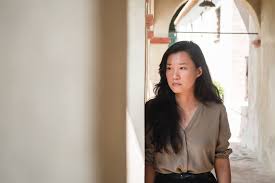
Yesterday morning, I wrote a “little poem.” You won’t find that in a glossary of poetry terms, of course, because “little” is fraught with multiple meanings. Think of a little apartment, for instance. For one prospective renter, it’s “cramped,” and for the next, it’s “cozy.”
In the poetry world, the Kingdom of Little Poetry can be found in ancient China and Japan. Haiku is best-known, sure, but the number of lines and syllables is of little import. The idea is to squeeze the maximum meaning possible from brevity’s wet towel.
The problem with little poetry? It’s much more difficult to judge. It’s “cramped” vs. “cozy” all over again. That is, one reader may find your short poem bountiful despite its economy, and another may judge it as so many empty calories.
These thoughts came to mind as I wrapped up a reading of Jenny Xie’s National Book Award nominee, Eye Level. Here’s an example of what I call a little poem from her book:
“Margins”
by Jenny Xie
Water striders on a pond’s surface,
light as calipers:
long sentence for which there are no words.
Indoors, silence travels from west to east.
The house I keep
no monastery.
Tsvetaeva, open on my bedside table.
Lines feeding on a crust
of lamplight.
It’s a cliché to say that big things come in small packages, but the truth is that expectations of our readers are heightened with little poetry. If ever there was a writer-reader pact, here it is: the reader is obliged to take what is implied by our few words and, out of it, fashion a house of inference.
As for the writer? His or her job is to judge when “just enough” has been reached. Like salt in Bashō’s broth, too little leaves the poem bland while too much ruins it irretrievably.
And so I look at my little poem again today, and will again tomorrow and many, many more tomorrows, because, paradoxically, little poems take a lot of time to get right.
Do you think Xie hits the right measurements in “Margins”? I only know this: I’m a sucker for famous poets (here, Marina Tsvetaeva) making cameos in contemporary poetry, and I rather like the idea of “Lines feeding on a crust / of lamplight.”
I feed my lamplight, too—nourish it by thinking big while writing little. An occasional “little poem,” that is.

8 thoughts on ““Lines Feeding on a Crust of Lamplight””
Sort of liked the little poem, though “crusty” lamplight makes me itch. I don’t see much difference between the effect of long poems and short poems; in fact, a good long poem often contains numerous intense epiphanies, those short poem moments.
Ken, one pedantic point: PLEASE don’t write “It’s cliché”! That error really annoys me because it’s common among our most educated. Cliche is the noun. Cliched is the adjective. Thank you!
I fixed it because I know you reread these posts each day. That’s for you!
Do you know Jim Moore’s “Invisible Strings”?
One of my favorite thrift store finds from last year.
Quite a few tasty crusts and crumbs in there…
Well, there’s an idea. Maybe I should plant my books in a few thrift stores. “Used Poetry.”
No, wait: “Pre-Owned Poetry,” I mean….
I’m pretty low-budget. The vast majority of my poetry library has come from a local $avers Thrift Store. I don’t know who does the buying (could just be their proximity to Webster University) but they regularly get very tasty stuff.
I don’t know who does the buying there or anywhere else. I only know that marketing poetry might be more difficult even than writing it.
A cruel fact of life, that, because EVERYone’s pretty low-budget. Not about cellphone plans and iced coffees-to-go and bottled water, but about poetry books.
Perhaps I should rename my book “Lost Iced Vanilla Latte of Happiness”? Then, customers every morning! 😉
Thank you so much for sharing this – you’ve crammed a lot of meaning into a small post 😉
Glad you enjoyed it.